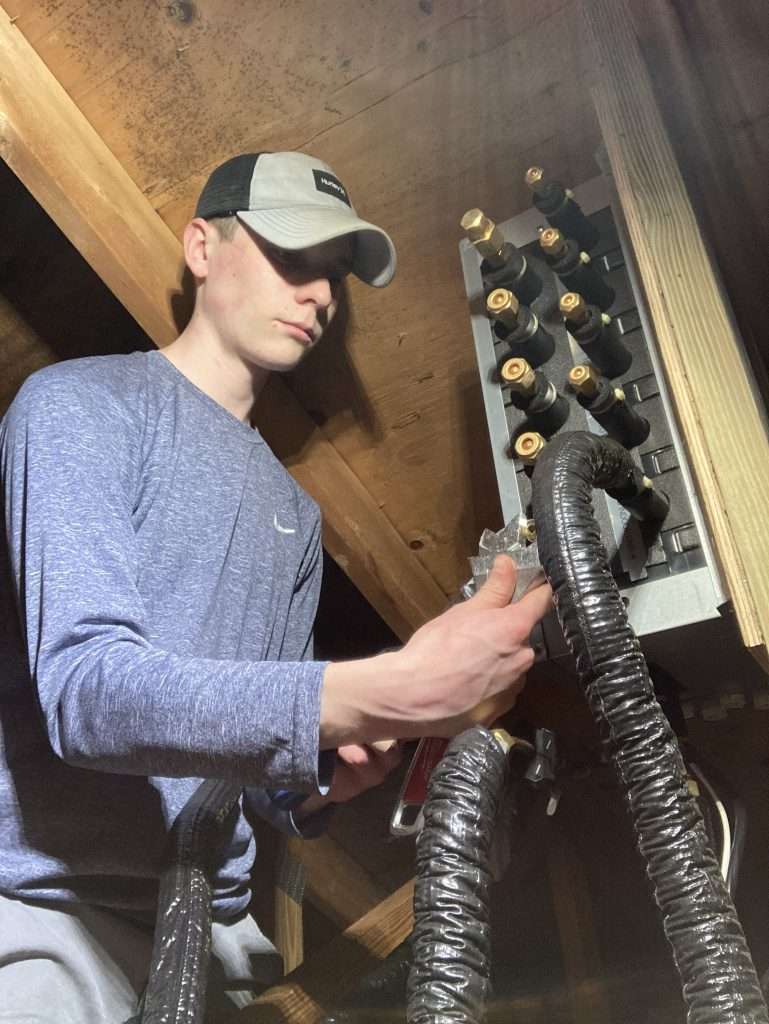For Chase Buffington, college isn’t a priority right now. The 18-year-old from Enfield, New Hampshire, is currently a high school senior working as a paid apprentice for a local heating, ventilation, and air conditioning company, a job that he plans to continue full-time for at least the next several years. “I definitely put some time into thinking about the college path, but the trade industry always grabbed me,” said Buffington, adding that he enjoys the hands-on, technical element of his work, as well as its variety. “I felt like I could get into the trades, start working, gain a skill, make a bunch of money, and just be ahead at a younger age.
“Then, if I want to go to college, I can do it later.”
Buffington is representative of a growing number of young people, especially men, who are eschewing a college degree for alternatives, such as apprenticeships, entrepreneurship, and microcredentialing. While overall college enrollment numbers have roughly rebounded to pre-pandemic levels, surveys indicate that more of today’s high schoolers are valuing on-the-job training over a traditional four-year college degree. Polls also show that Americans overall have soured on higher education in recent years, with only 36% saying in a recent Gallup report that they have a “great deal/quite a lot” of confidence in the sector, compared to 57% in 2015.
Connor Boyack isn’t surprised. He is the new president of Praxis, a decade-old apprenticeship preparation and placement program that his free-market organization, the Libertas Network, acquired last month. Boyack believes the future of postsecondary pathways lies in creating more opportunities for teenagers and young adults to explore their interests and gain career-related skills and knowledge outside of a conventional college classroom. Boyack’s 2019 book, Skip College (to which I was a contributor), offered strategies and suggestions for finding personal satisfaction and career fulfillment without higher education. “Since then, the problem has worsened,” Boyack told me, explaining that mounting debt, changing economic realities, and higher education’s perceived progressive ideological leanings is prompting more young people to forgo a college diploma.
“There have never been more reasons and more opportunities to build a successful life without spending the time, money, and mental energy pursuing that piece of paper,” Boyack said.


Buffington says both he and his friends are seizing these opportunities to gain on-the-job work experience immediately after high school by reaching out to local business owners, who have been enthusiastic about hiring them. They start with a part-time apprenticeship role and join the company full-time after high school graduation. Mike Harris, who owns Cardigan Mechanical where Buffington works, says there are ample opportunities for young people to gain job skills and explore different career paths through apprenticeships. “I would love to hire more ambitious apprentices like Chase,” said Harris, who has an engineering degree from Vanderbilt University but says he wishes he had discovered the trades earlier on in his career. “College is one path, but there are so many more options. I think kids today see that and are being more thoughtful about what they want their life and work to look like.” He also encourages parents to support their children in considering the trades and related occupations.
In her new book, Who Needs College Anymore? Imagining A Future Where Degrees Won’t Matter, Kathleen deLaski looks more closely at the college alternatives currently available and why more students are interested in them. She says debt is the biggest reason, but young people are also more eager for practical, “just-in-time-learning” options connected more closely with career possibilities.
A senior advisor to the Project on Workforce at Harvard University, and an adjunct professor at George Mason University, deLaski is a strong proponent of higher education, as well as high-quality alternatives. She urges colleges and universities to explore creative ways to be more responsive to the needs and interests of students. “Some colleges are creating ‘micropathways’ that provide a six-month fast track to professional employment,” said deLaski, adding that workplaces also need to adapt. “Employers beyond the trades need to consider apprenticeship, and they need to provide certifications in a broader number of fields so that learners can demonstrate skills mastery without a degree.”
As colleges and universities, as well as employers, respond to the changing preferences of a young workforce, a college degree can become one of many meaningful options to career success and individual satisfaction. Buffington, whose parents both have bachelor’s degrees, holds open the possibility of going to college in the future if he thinks it is necessary.
For now, though, he says he loves his apprenticeship work and hopes more people his age will research the wide range of pathways to adulthood, including but not limited to college. “I would say if you’re confused or pondering what you want to do, the trades are a great thing that you can try out,” he said. “It’s risk- and pretty much money-free, and you can very easily start working with a company and learn a skill. You can find out if you do or don’t like it, and then make a further decision.”







